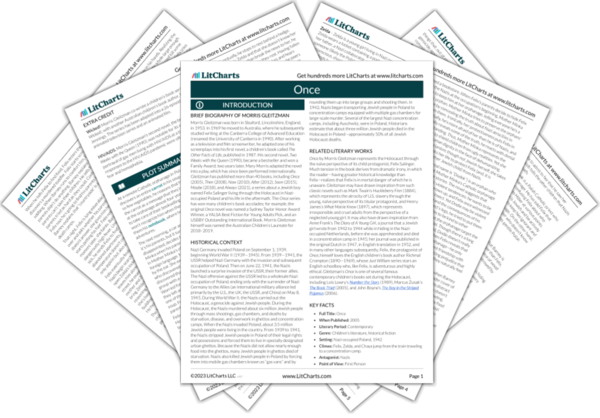In Once, antisemitism is a dehumanizing force, against which people assert their human dignity by exercising moral choice. The novel’s protagonist, Felix, is a nonreligious Jewish boy living in a Catholic orphanage. Having spent almost four years among nuns, Felix occasionally prays not only to God but also to Jesus Christ, the Virgin Mary, the Pope, and to his favorite children’s book author, Richmal Crompton. Though Felix vaguely recognizes a Star of David and a menorah, he doesn’t know what they’re called. By emphasizing that Felix’s Jewishness is almost purely nominal, not based on his religious convictions or even his actual cultural practices, the novel highlights that the Nazis want to kill Jewish people just for their ancestry, not for anything they believe or have done, thus highlighting that antisemitism dehumanizes people based purely on ethnicity. In the face of antisemitic dehumanization, the novel’s protagonists assert their human dignity by exercising moral choice—or, in other words, by trying to do the right thing—even in positions of powerlessness. For example, Felix saves a little girl named Zelda after he finds her unconscious beside her burning house and murdered parents. As he travels to the city searching for his own parents, he repeatedly puts himself in danger to protect Zelda from Nazi violence. When she comes down with a dangerously high fever, he sneaks through a Nazi-patrolled ghetto after curfew to find her aspirin—and brings it back to her even after her discovers that her father was likely a Nazi collaborator killed by the Polish resistance. Even though Felix has very little power to influence the world, his insistence on trying to protect Zelda and his refusal to blame her for things her father did illustrate his goodness, his moral agency, and his human dignity—and thus the evil of antisemitism, which would deny he possesses those qualities.
Antisemitism vs. Human Dignity ThemeTracker

Antisemitism vs. Human Dignity Quotes in Once
At last. Thank you, God, Jesus, Mary, the Pope, and Adolf Hitler. I’ve waited so long for this.
It’s a sign.
This carrot is a sign from Mum and Dad. They’ve sent my favorite vegetable to let me know their problems are finally over. To let me know that after three long years and eight long months things are finally improving for Jewish booksellers. To let me know they’re coming to take me home.
I turn and run down the steps. Halfway down I crash into a kid coming up. As I scramble over him, I see his face. He’s older than he was, but I still recognize him. Wiktor Radzyn, one of the Catholic kids from my class when I went to school here.
I don’t stop.
I keep running.
“Clear off, Jew!” yells Wiktor behind me. “This is our house now.”
“We’re playing grabbing Jews in the street,” says the little boy.
“I’m a Jew,” says the little girl. “He’s a Nazi. He’s going to grab me and take me away. Who do you want to be?”
Why are some people kind to us Jewish book owners and some people hate us? I wish I’d asked Mr. Kopek to explain. And also to tell me why the Nazis hate Jewish books so much that they’ve dragged Mum and Dad and all their Jewish customers off to the city.
I tell myself a story about a bunch of kids in another country whose parents work in a book warehouse and one day a big pile of Jewish books topples onto the kids’ parents and crushes them and the kids vow that when they grow up they’ll get revenge on all the Jewish books and their owners.
It doesn’t feel like a very believable story.
Please, Mum and Dad, I beg silently.
Don’t be like these people.
Don’t put up a struggle.
It’s only books.
Each person is wearing an armband. Not a red and black armband like the Nazis had at the orphanage. These are white with a blue star, a Jewish star like on some of the Jewish houses at home. Must be so these travelers can recognize the other members of their group. We used to have paper saints pinned to our tops on sports day so everyone could see which dormitory we were from.
“Excuse me,” I say to a man walking nearby. “Are you a book lover?”
The man stares at me as if I’m mad. His gray sagging face was miserable before, but now he looks like he’s close to tears. He looks away. I feel terrible. I wish I hadn’t asked.
Not just because I’ve made a suffering Jewish man feel upset at the sight of a crazy kid. Also because I’ve got a horrible suspicion I know the answer to the question.
Maybe it’s not just our books the Nazis hate.
Maybe it’s us.
“Sometimes […] parents can’t protect their kids even though they love them more than anything else in the world. Sometimes, even when they try their very hardest, they can’t save them.”
If Zelda’s dad’s a Nazi, does she deserve carrot soup and aspirin?
Yes.
She can’t help what her father did. Plus he’s dead now and so’s her mum and I don’t know if she’s got any other living relatives but after what we’ve been through together that makes me one and I say yes.
“Zelda,” I moan. “Why didn’t you stay?”
“I bit the Nazi,” she says. “Don’t you know anything?”
“Here,” I say to the woman in the corner. “Use this.”
The other people pass it over to her and when she sees what it is she starts crying.
“It’s all right,” I say. “I haven’t written on it.”











